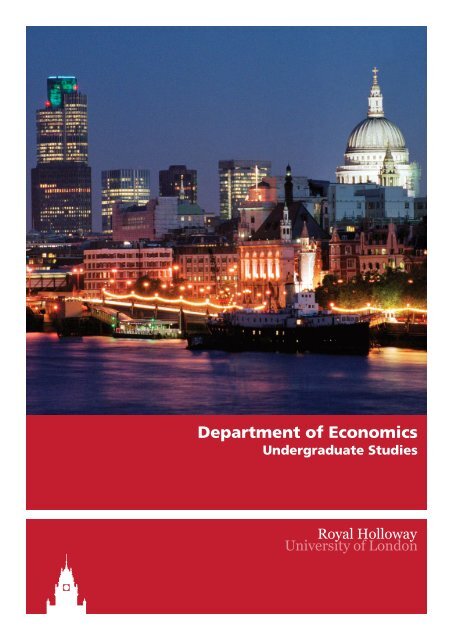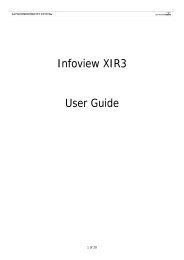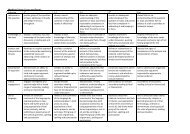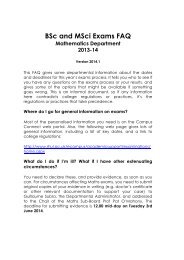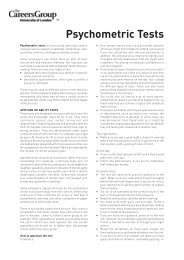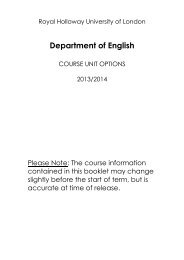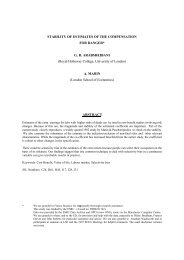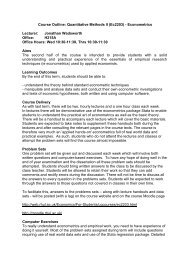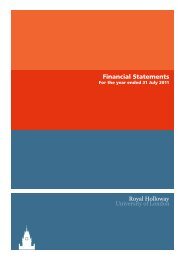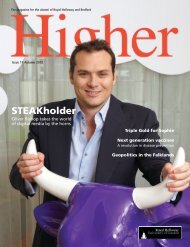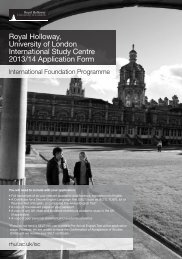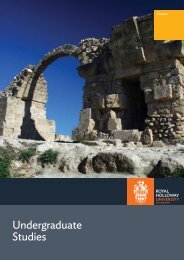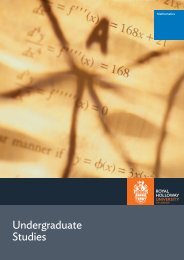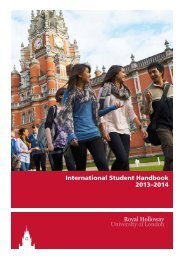Department of Economics - Royal Holloway, University of London
Department of Economics - Royal Holloway, University of London
Department of Economics - Royal Holloway, University of London
- No tags were found...
You also want an ePaper? Increase the reach of your titles
YUMPU automatically turns print PDFs into web optimized ePapers that Google loves.
<strong>Royal</strong> <strong>Holloway</strong><strong>University</strong> <strong>of</strong> <strong>London</strong><strong>Royal</strong> <strong>Holloway</strong> is widely recognised on the world stage as one <strong>of</strong> the UK’sleading teaching and research universities. One <strong>of</strong> the larger colleges <strong>of</strong> the<strong>University</strong> <strong>of</strong> <strong>London</strong>, we are strong across the sciences, social sciences, arts andhumanities. Our 8,500 students work with internationally renowned scholars in20 academic departments. The <strong>University</strong> <strong>of</strong> <strong>London</strong> degree gained by our talented,high-achieving graduates is valued the world over.As a cosmopolitan community, with students from 130 countries, we focus on thesupport and development <strong>of</strong> the individual. Our friendly campus, just 19 miles west<strong>of</strong> central <strong>London</strong>, provides a unique environment for university study. Campus liferevolves around the Students’ Union, which runs over 100 societies and sports clubs,and we are recognised as <strong>London</strong>’s best sporting college.
<strong>Economics</strong>The <strong>Department</strong> <strong>of</strong> <strong>Economics</strong> at <strong>Royal</strong> <strong>Holloway</strong> isone <strong>of</strong> the UK’s leading teaching and research centresin <strong>Economics</strong>. In the recent Research AssessmentExercise, it was rated as one <strong>of</strong> the top 10 in the UK.Our degrees incorporate all the major aspects <strong>of</strong>economic thought and are designed for the studentwho – regardless <strong>of</strong> future career plans – wantsto follow an intellectually challenging and diverseprogramme <strong>of</strong> study.ContentsWhy study <strong>Economics</strong>? 4Why choose <strong>Economics</strong> at <strong>Royal</strong> <strong>Holloway</strong>? 5Admissions and entry requirements 6Degree programmes and structure 8Course information 10Joint degree options 12Teaching and assessment 13Career prospects 14Other information 16Contact detailsHead <strong>of</strong> <strong>Department</strong>Pr<strong>of</strong>essor Jeff Frank (PhD, Yale)j.frank@rhul.ac.ukAll enquiriesFaculty AdministratorT: +44 (0)1784 443381ugecon@rhul.ac.uk<strong>Department</strong> <strong>of</strong> <strong>Economics</strong><strong>Royal</strong> <strong>Holloway</strong>, <strong>University</strong> <strong>of</strong> <strong>London</strong>Egham, Surrey, TW20 0EX, UKT: +44 (0)1784 414005F: +44 (0)1784 439534This brochure is designed to complement <strong>Royal</strong> <strong>Holloway</strong>’sUndergraduate Prospectus and information on the <strong>Department</strong>’swebsite at www.rhul.ac.uk/<strong>Economics</strong>It is also available as a PDF at: www.rhul.ac.uk
Why study <strong>Economics</strong>?<strong>Economics</strong> has long been the subject <strong>of</strong> choice for students seekingcareers in public and private management, in financial institutions,and in government. This is in part due to the importance <strong>of</strong> economicanalysis in all these fields. Managers need to know how marketswork and how a business can prosper in its market environment.Policy-makers need to consider the constraints imposed by economicfactors, but also the limits to the market and the role <strong>of</strong> governmentintervention. However the real, practical skills gained from an<strong>Economics</strong> degree go beyond the understanding <strong>of</strong> economics itself.<strong>Economics</strong> students gain important quantitative and computingskills that are widely applicable. They gain experience in logical andphilosophical reasoning. They also develop their communicationabilities. Few other degree subjects provide this full complement <strong>of</strong>skills, from the quantitative to the philosophical.<strong>Economics</strong> is a rigorous and difficult degree subject. It is importantthat students recognise this when they choose to do an <strong>Economics</strong>degree. While our <strong>Department</strong> maintains a friendly and informalatmosphere, students are expected to work hard. The good newsis that the market recognises and rewards the real knowledge andskills developed in an <strong>Economics</strong> degree. In addition, there is a realacademic interest to the study <strong>of</strong> <strong>Economics</strong> that does not always holdfor newer vocational subjects.4
Why choose <strong>Economics</strong> at <strong>Royal</strong> <strong>Holloway</strong>?WelcomeThe financial crisis and the new age <strong>of</strong> austerity have increased interestin <strong>Economics</strong> degrees. The new normal will involve a re-thinking <strong>of</strong>economic policies to adjust to a heightened sense <strong>of</strong> reality about thefuture. This is a particularly exciting time to be studying <strong>Economics</strong>.<strong>Royal</strong> <strong>Holloway</strong> is a particularly exciting place to do these studies.Our staff are researching at the boundaries <strong>of</strong> economic analysis.We are exploring the interactions <strong>of</strong> financial markets with the realeconomy; how education needs to be adjusted to meet the demandsfor higher skilled workers; the role for immigration in a slowergrowth economy; how the public sector needs to be organised torun efficiently; natural resources and the limits to growth; how toorganise an economy where individuals do not always behave in aself-interested manner; and political economy questions such as howinsurgencies develop in countries.In the next decade, the best education is not just about learningstandard materials and preparing for standard examinations. Studentswill need to have a deeper understanding <strong>of</strong> the models and methods<strong>of</strong> <strong>Economics</strong>, and about how to apply those models in the real world.We think <strong>Royal</strong> <strong>Holloway</strong> is the ideal place for you to engage in thatchallenging, and exciting future.Pr<strong>of</strong>essor Jeff FrankHead <strong>of</strong> <strong>Department</strong><strong>Royal</strong> <strong>Holloway</strong> is one <strong>of</strong> the largest colleges in the <strong>University</strong> <strong>of</strong><strong>London</strong>, which is one <strong>of</strong> the leading teaching and research universitiesin the world. <strong>Royal</strong> <strong>Holloway</strong>’s <strong>Economics</strong> <strong>Department</strong> is one <strong>of</strong> thetop research centres for <strong>Economics</strong>. It is committed to providing one <strong>of</strong>the best undergraduate programmes in the UK.Staff in the department have teaching experience at some <strong>of</strong>the leading research universities in the world including: Brown,Cambridge, LSE, Yale and Harvard. Teaching in the departmentwas given a score <strong>of</strong> 22 out <strong>of</strong> 24 in the latest rating <strong>of</strong> the QualityAssurance Agency for Higher Education (QAA). The <strong>Economics</strong><strong>Department</strong> is recognised as joint 9th in the country in terms <strong>of</strong>producing the highest quality research. Eighty percent <strong>of</strong> its researchsubmitted in the latest Research Assessment Exercise (RAE 2008) isranked world-leading or internationally excellent (rated 3* and 4*).What distinguishes <strong>Economics</strong> at <strong>Royal</strong> <strong>Holloway</strong>? There are threemain features:• <strong>Royal</strong> <strong>Holloway</strong> has chosen to emphasise its undergraduateprogramme. While it maintains a small and select taught Mastersand research student programme <strong>of</strong> about 60 students, its primaryfocus is upon establishing the best undergraduate <strong>Economics</strong>degrees in the UK.• We have the advantage <strong>of</strong> being located on an exceptionallyattractive wooded campus in Surrey, 20 miles from central <strong>London</strong>.• We were established as a new department relatively recently in1995. This provided a unique opportunity to develop degree coursesfrom scratch. Each course, and its place within the degree structure,was planned without preconceptions. This has led to somedifferences in the course structure from those <strong>of</strong> other <strong>Economics</strong>departments. For example, we give equal weight to the quantitative,theoretical and the political economy aspects <strong>of</strong> the subject. Evenmore fundamental features <strong>of</strong> the programme – the quality <strong>of</strong> thestaff, their enthusiasm, and the preparation <strong>of</strong> up-to-date lecturesbased upon the latest research – will be apparent when you visitduring an Open Day or when you attend your first lectures, classes,workshops and tutorials.5
Degree programmes and structureThe <strong>Department</strong> <strong>of</strong>fers two main Single Honours <strong>Economics</strong> degrees at <strong>Royal</strong> <strong>Holloway</strong>:• BSc (Econ) <strong>Economics</strong>• BSc (Econ) Financial and Business <strong>Economics</strong>Both these degrees provide an excellent background for starting a career or for further study. There is a common set <strong>of</strong> required courses thatprovide a rigorous training in quantitative economic analysis. Financial and Business <strong>Economics</strong> students then specialise in the areas <strong>of</strong> financialmarkets and industrial economics. The course units for each <strong>of</strong> these degree schemes are shown in the chart below.BSc (Econ) <strong>Economics</strong>Year 1EC1101 Principles <strong>of</strong> <strong>Economics</strong>EC1102 Quantitative Methods IEC1103 <strong>Economics</strong> Workshop<strong>Economics</strong> first year options or a course inanother departmentYear 2EC2201 MicroeconomicsEC2202 MacroeconomicsEC2203 Quantitative Methods II<strong>Economics</strong> second year options or a course inanother departmentYear 34 units from <strong>Economics</strong> final year optional coursesor3 units from <strong>Economics</strong> final year optional coursesand 1 course in another departmentBSc (Econ) Financial & Business <strong>Economics</strong>Year 1EC1101 Principles <strong>of</strong> <strong>Economics</strong>EC1102 Quantitative MethodsEC1103 <strong>Economics</strong> Workshop<strong>Economics</strong> first year options or a course inanother departmentYear 2EC2201 MicroeconomicsEC2202 MacroeconomicsEC2203 Quantitative Methods IIEC2211 Financial Markets and InstitutionsEC2212 Industrial Growth and CompetitionYear 3EC3313 Industrial <strong>Economics</strong>EC3314 Financial <strong>Economics</strong>2 units from <strong>Economics</strong> final year optional coursesor1 unit from <strong>Economics</strong> final year optional courses andone unit in another department8
Degree structureBA and BSc in Politics, Philosophy and <strong>Economics</strong> (Subject to validation)This course will provide students with the opportunity to study three disciplines that are crucial for an understanding <strong>of</strong> the complex dynamics <strong>of</strong>today’s world. Students will study a common foundation in the first year, and an advanced seminar and dissertation unit in their final year thatdevelops links across the three disciplines – a distinctive feature <strong>of</strong> the course. Students have great flexibility to vary their degrees in the secondand third years in such a way as to graduate with one <strong>of</strong> three awards: BSc Politics, Philosophy and <strong>Economics</strong>; BA Politics, Philosophy and<strong>Economics</strong>; and BA Politics and Philosophy with <strong>Economics</strong>..Year 1EC1101 Principles <strong>of</strong> <strong>Economics</strong> (1 unit)EC1102: Quantitative Methods <strong>of</strong> <strong>Economics</strong> (1 unit)PR1400: Introduction to Politics and Government(1 unit)PY1001: Fundamental Questions in Philosophy(1 unit)Year 2Students must choose at least one, and no morethan two units from available courses in eachdiscipline <strong>of</strong> politics, philosophy and economics, fora total <strong>of</strong> four course units for the year.As part <strong>of</strong> their second year philosophy studentsmust take:PY2001 Introduction to European Philosophy 1:From Kant to Hegel (0.5 units)PY2002 Mind and World (0.5 units)<strong>Economics</strong> courses are limited to:EC2201 Microeconomics (1 unit)EC2202 Macroeconomics (1 unit)Year 3PPE3000: Advanced Seminar and Dissertation inPolitics, Philosophy and <strong>Economics</strong> (1 unit)A further three units <strong>of</strong> courses from availableoptions in politics, philosophy and economics mustbe undertaken. Students may concentrate theirchoices on courses from one <strong>of</strong> the disciplines,but must choose courses <strong>of</strong> at least one half-unitfrom at least two subjects. They may also dividetheir choices among all three subjects. Choices in<strong>Economics</strong> are subject to the following conditions:1) Students can take third year <strong>Economics</strong> coursesONLY if they have taken and passed both EC2201and EC2202 in year 2.2) Students who have taken only EC2201 or EC2202in year 2 may only take the other course in year 3.Depending on course selections and achievement, students who meetthe minimum College requirements for award <strong>of</strong> degree will be eligibleto exit with one <strong>of</strong> the following degree titles:1) Students who pass at least two units worth <strong>of</strong> dedicated third year<strong>Economics</strong> courses will graduate with a BSc Politics, Philosophyand <strong>Economics</strong>.2) Students who pass dedicated third year <strong>Economics</strong> courses <strong>of</strong> atleast 0.5 units but less than two units will graduate with aBA Politics, Philosophy and <strong>Economics</strong>.3) Students who do not pass any third year <strong>Economics</strong> courses willgraduate with a BA Politics and Philosophy with <strong>Economics</strong>.BSc <strong>Economics</strong>, Politics and International RelationsYear 1Students must take:EC1101 Principles <strong>of</strong> <strong>Economics</strong>*EC1102 Quantitative Methods <strong>of</strong> <strong>Economics</strong>*Choose two from:PR1400: Introduction to Politics andGovernmentPR1500: Introduction to InternationalRelationsPR1520: Classic and Contemporary Readingsin Politics and International RelationsPR1600:Introduction to Research Methods in Politics andInternational RelationsYear 2EC2201 Microeconomics*EC2202 Macroeconomics*Choose two units from available courses in Politicsand International Relations**Year 3Choose two units from <strong>Economics</strong> final year optionsChoose two units from Politics and InternationalRelations final year options*** required to take and to pass for the award <strong>of</strong> the relevant degree title** the units available will be confirmed by the <strong>Department</strong> <strong>of</strong> Politics and International Relations9
Course informationFirst Year coursesPrinciples <strong>of</strong> <strong>Economics</strong> covers standard microeconomic andmacroeconomic analysis. The course is designed to be suitable forstudents with or without A-level <strong>Economics</strong>. Quantitative Methodsin <strong>Economics</strong> is a two year sequence which introduces students tomathematical, statistical and computing techniques. To accommodatestudents <strong>of</strong> differing backgrounds (about half <strong>of</strong> our students haveA-level Mathematics, for example), we apply a broad variety <strong>of</strong>teaching methods. In addition to standard lectures and classes,special workshops and tutorials are available to students. <strong>Economics</strong>Workshop is a unique first year course that provides a first opportunityto consider the philosophical and historical background to economics.Too <strong>of</strong>ten, students can view economics as a purely technical subject.This course, taught by lectures and tutorials, gives students a chanceto reflect upon and discuss the ideological and historical dimension <strong>of</strong>economic thought and practice. Economic policy is the focus <strong>of</strong> thefirst year optional courses. The <strong>Economics</strong> <strong>of</strong> European Integration andInternational Economic Policy are two such options. Students may alsochoose an option from another department in the College.Second and Third Year coursesIn the second year, students take the economic analysis coursesMicroeconomics and Macroeconomics. They continue theirquantitative studies in Quantitative Methods II. Finally, students onthe Financial and Business <strong>Economics</strong> degree are required to take thecourses in Financial Markets and Institutions and in Industrial Growthand Competition. Students on the <strong>Economics</strong> degree may take theseoptions, or select from an expanding list <strong>of</strong> economic history andpolitical economy choices.Final Year courses<strong>Economics</strong> single honours degree students choose four third yearcourses from a list <strong>of</strong> options. One option is EC3400 (Extendedessay in <strong>Economics</strong>) where students undertake independent researchto produce a dissertation which applies economic theory andquantitative analysis to a particular policy or business problem <strong>of</strong> theirchoice. Other options may include Public <strong>Economics</strong>, Development<strong>Economics</strong>, Labour <strong>Economics</strong>, The <strong>Economics</strong> <strong>of</strong> Education, Financial<strong>Economics</strong> and Industrial <strong>Economics</strong>, although the availability<strong>of</strong> optional units varies from year to year. Financial and Business<strong>Economics</strong> students are required to take the courses in Financial<strong>Economics</strong> and Industrial <strong>Economics</strong>.10
“All the lecturers are very approachable and always willing to listenand help should you need advice. The very supportive atmosphere<strong>of</strong> the <strong>Economics</strong> <strong>Department</strong> has really helped me develop myskills and knowledge, both academic and personal.”Hannah Carter, BSc <strong>Economics</strong>11
Joint degree optionsThe department <strong>of</strong>fers five joint and one minor honours degree:JointThe <strong>Department</strong> <strong>of</strong>fers three joint honours degrees:• BSc <strong>Economics</strong> and Management• BSc <strong>Economics</strong> and Mathematics• BSc Finance and Mathematics• BSc <strong>Economics</strong>, Politics and International RelationsMinor• BA Politics, Philosophy and <strong>Economics</strong>The <strong>Economics</strong> and Management degree combines the coreprogramme <strong>of</strong> the <strong>Economics</strong> degrees with that <strong>of</strong> the Managementdegree. The two parts <strong>of</strong> the degree, while looking at similar subjects,use different methods to understand them. <strong>Economics</strong> uses primarilyquantitative and formal analysis, while Management emphasisesthe case study approach. <strong>Economics</strong> is the ‘home department’ for<strong>Economics</strong> & Management joint honours students. This means thatwe will deal with issues <strong>of</strong> registration and student welfare, and youshould approach us with any questions or problems.The <strong>Economics</strong> and Mathematics degree plus the Finance andMathematics degree combine the core programme <strong>of</strong> the <strong>Economics</strong>degrees with that <strong>of</strong> the Mathematics degree. These degrees providean excellent background for a career in business or finance, sincethey develop the quantitative skills that are in the greatest demand.<strong>Economics</strong> is the ‘home department’ for these joint degrees, whichmeans that we will deal with issues <strong>of</strong> registration and student welfareand you should approach us with any questions or problems.The <strong>Economics</strong>, Politics and International Relations degree combinesthe core programme <strong>of</strong> the <strong>Economics</strong> degree with foundationand option courses <strong>of</strong>fered by Politics and International Relations.These disciplines have many natural affinities between them, andtheir synergies lend themselves well to students who are interestedultimately in pursuing careers in various policy fields as well as in theareas <strong>of</strong> politics/international relations and economics generally, inboth the public and private sectors.The Politics, Philosophy and <strong>Economics</strong> degree will provide studentswith the opportunity to study three disciplines that are crucial for anunderstanding <strong>of</strong> the complex dynamics <strong>of</strong> today’s world. Studentsstudy a common foundation in the first year, and an advanced seminarand dissertation unit in their final year that develops links across thethree disciplines – a distinctive feature <strong>of</strong> the course. Students havegreat flexibility to vary their degrees in the second and third yearsin such a way as to graduate with one <strong>of</strong> three awards: BSc Politics,Philosophy and <strong>Economics</strong>; BA Politics, Philosophy and <strong>Economics</strong>; andBA Politics and Philosophy with <strong>Economics</strong>.12
Teaching and assessmentOur degrees are made up <strong>of</strong> 12 units. In each year a student takeshalf and full unit courses amounting to four units. Most coursesin the <strong>Department</strong> involve one or two hours <strong>of</strong> weekly lectures and aweekly tutorial or seminar group. In addition, there may be workshopsand classes. We adjust the teaching methods to the needs <strong>of</strong> theparticular course and in light <strong>of</strong> the differing backgrounds <strong>of</strong> students.For example, the <strong>Economics</strong> Workshop includes tutorials. Classes forMicroeconomics and Macroeconomics in the second year are larger,although additional help sessions and tutorials are provided. For thequantitative methods courses, teaching varies from classes <strong>of</strong> about20, meeting in the computer laboratory, to individual tutorial sessions.Assessment is primarily by end <strong>of</strong> year exams. Students are requiredto submit written work for each course, but in most courses thisis to help them in their studying and revision, and to provide anopportunity for advice and comments, rather than to be part <strong>of</strong> theassessment process itself. In the quantitative methods courses,continuous assessment in the form <strong>of</strong> in-class tests and a projectprovides a large component <strong>of</strong> the overall mark. For the <strong>Economics</strong>Workshop, assessment is by two extended essays. The <strong>Department</strong>believes very strongly in a traditional university education and that theexamination process, where students simultaneously revise theirsubjects during a concentrated examination period, serves afundamental purpose in this. During the period <strong>of</strong> revision,students can integrate the different courses they have studied overthe year and this brings together their knowledge and understanding<strong>of</strong> <strong>Economics</strong>.13
Your future careerStep <strong>London</strong> Graduate Internship programmeThis programme is run by The Careers Group and <strong>of</strong>fer paidinternships to graduates at:www.careers.lon.ac.ukEmployabilityUndergraduate careers supportThe Careers Service is conveniently situated within the same buildingas the <strong>Economics</strong> department and is affiliated with The Careers Group,<strong>University</strong> <strong>of</strong> <strong>London</strong>. At 100 years old is one <strong>of</strong> the largest and mostestablished higher education careers organisations in Europe.Undergraduate Careers Advisers <strong>of</strong>fer plenty <strong>of</strong> hands-onsupport,along with one-to-one coaching sessions, designed to assistyou with your career strategy. In addition to which Careers Advisorsfocus on areas such as entrepreneurship and provide a specialistservice for international students. It is strongly advised that youprepare for a job as early as possible by fully utilising the CareersCentre facilities and attending activities and events to network andgain information. Our workshops will help you with:• Using social media for job hunting• Finding internships and work experience• CV’s, Applications, Interviews• Assessment centres• Making the most <strong>of</strong> the recruitment fair• What to do if you don’t know what to do!Maximising your job opportunitiesEmployers also look for such skills such as teamwork, problemsolvingand decision-making. The best job applicants got involvedwith activities such as student societies, sports teams, volunteeringand part-time work. Some student societies work with the CareersService for assistance with guest speakers and vocational information.These include the <strong>Economics</strong> Society, Entrepreneurs, the Law Societyand the Management and Investment society. Your involvementwith co-curricular activities can lead to you being awarded the<strong>Royal</strong> <strong>Holloway</strong> Passport, a recent initiative that helps you market yourskills to employers.Egham is part <strong>of</strong> a business hub that has built up around Heathrowand the M25 which provides opportunities to work in the area forlocal, national and multi-national companies. There are businessessituated close to the college that include accountants, managementconsultants, law firms, IT and utilities companies and numerousrestaurants and shops. Our affiliation with the Careers Group, providesaccess to employers and careers events in <strong>London</strong> as well as locally.Careers activities and employer events• PWC, psychometric assessment skills session• Proctor & Gamble – R&D presentation• Deloitte, making successful applications, skills session• Ernst & Young, CV clinic• College <strong>of</strong> Law, is Law the careers for me?• RAF interviews• Centrica, succeeding at interviews skills session• CV workshop, Job applications workshop• Transferable skills from volunteering workshop• Centrica summer internships presentationwww.rhul.ac.uk/careers/eventsServices for students who wish to:• Start a business, social enterprise or charity• Become more enterprising and entrepreneurial• Enhance employability with enterprise skillswww.rhul.ac.uk/rhentrepreneursStart-up Wednesdays – workshops and skillsdevelopment• Student Societies – gain experience through involvement in societies• Enterprise Lab – one-to-one business guidance/ incubation services• Competitions – raise funds for your business/social enterprise• Enterprise Training – boot camps/department workshops/one-<strong>of</strong>f events14
“My degree was in economic and public administration. I wouldn’t claim to have been the mostconscientious or brilliant <strong>of</strong> students, but the grounding I was given has been the foundation <strong>of</strong>my understanding <strong>of</strong> much <strong>of</strong> the current political debate on the state <strong>of</strong> the economy. I do enjoyoccasionally interviewing some <strong>of</strong> my former tutors. My time to ask them the difficult questions.”Robbie Gibb Alumnus, Editor BBCAfter graduating you will become part <strong>of</strong> the <strong>Royal</strong> <strong>Holloway</strong> Alumni.We are in contact with 65,000 previous students both in the UK andabroad, enabling graduates to network with each other worldwide.To help you keep in touch we will send you information throughHigher, our twice yearly magazine and our regular Alumni UpdateeNewsletter. Many alumni give their support because their time hereleft a positive impression on them, which they are proud <strong>of</strong>. They arevery active and <strong>of</strong>ten become ambassadors <strong>of</strong> the university, helpingwith events, graduate recruitment, career talks, mentoring, networkingand <strong>of</strong>fering job opportunities. Some <strong>of</strong> our recent alumni eventshave included:• Alumni Lecture Series – ‘The Apprentice’ finalist, Debra Barr• Start It! <strong>Royal</strong> <strong>Holloway</strong> Entrepreneurs events – Business clinics,Bright Ideas Masterclass & Start-up Planning and events featuringspeakers from ‘Dragons Den’www.royalhollowayentrepreneurs.com/• Alumni in the city – networking and socialising• Hancock Cup Alumni Sports Day – basketball, netball, football,rugby, hockey, mixed lacrosse, golf, American football• International weekend reunionsFor further information about <strong>Royal</strong> <strong>Holloway</strong> alumni events pleasevisit: www.rhul.ac.uk/For-Alumni/news_and_events.htmlThrough the alumni programme you can gain many benefits, some <strong>of</strong>which include:• <strong>Royal</strong> <strong>Holloway</strong> Sports Centre membership• Free access to the libraries• Alumni bursaries for postgraduate study• Ongoing careers support through our Careers ServiceGraduate Pr<strong>of</strong>ileAlumnus: James LambertSubject: <strong>Economics</strong>Graduated: 2003 (BSc), 2004 (MSc)Place <strong>of</strong> Work: AshurstPosition: EconomistIt was a very friendly university wherestudents <strong>of</strong> all backgrounds anddepartments mixed easily. Whilst theCollege had grown significantly, it was stillsufficiently small to create an atmospherein which one felt that one knew a goodproportion <strong>of</strong> both staff and students.This is a big differentiating factor fromother universities.Graduate Pr<strong>of</strong>ileAlumna: Ying ZhouSubject: <strong>Economics</strong>Graduated: 2007Place <strong>of</strong> Work: NAFMIIPosition: Foreign AffairsSpending the summer <strong>of</strong> my secondyear as an accountant at Shell in Chinaenabled me to develop key s<strong>of</strong>t skills.Communication, problem solving andindependent thinking, alongside theacademic skills that I gained throughmy degree.• Discounts on products and servicesWe always encourage our alumni to get involved inorganising such events to help bring the alumni community closertogether. For further information please visit the <strong>Royal</strong> <strong>Holloway</strong>Alumni website: www.rhul.ac.uk/alumni/15
Academic staffDan Anderberg, PhD (Lund)Public <strong>Economics</strong>, Labour <strong>Economics</strong>, Family <strong>Economics</strong>Anderberg, D. (2009). ‘Optimal Policy and the Risk-Properties <strong>of</strong> HumanCapital Reconsidered’. Journal <strong>of</strong> Public <strong>Economics</strong> 93, 1017–1026.Anderberg, D. (2007) ‘Investments in Education as Self-Enforcing Exchangeamong Generations’. European Economic Review 51, 1813–1827.Jesper Bagger, PhD (<strong>University</strong> <strong>of</strong> Aarhus)Labour <strong>Economics</strong>, Applied Econometrics, MacroeconomicsWage Sorting Trends with Kenneth Sørensen and Rune Vejlin Thisversion: July 2012 Tenure, Experience, Human Capital and Wages:A Tractable Equilibrium Search Model <strong>of</strong> Wage Dynamics with FrancoisFontaine, Fabien Postel-Vinay and Jean-Marc Robin This version:August, 2011 Earlier versions circulated since 2006 under the title“A Feasible Equilibrium Search Model <strong>of</strong> Individual Wage Dynamicswith Experience Accumulation” Revision requestedJob Durations and the Job Search Model: A Two-Country, Multi-Sample Analysis with Morten Henningsen This version: February, 2011An Equilibrium Model <strong>of</strong> Wage Dispersion and SortingArnaud Chevalier, PhD (Birmingham)Labour <strong>Economics</strong>, Education <strong>Economics</strong>, Family <strong>Economics</strong>Students’ academic self-perceptionChevalier, A., Gibbons, S., Thorpe, A., Snell, M. & Hoskins, S. Dec-2009 In: <strong>Economics</strong> <strong>of</strong> Education Review. 28, 6, p. 716–727.Overeducation and the skills <strong>of</strong> UK graduatesChevalier, A. & Lindley, J. 2009 In: Journal <strong>of</strong> the <strong>Royal</strong> StatisticalSociety: Series A (Statistics in Society). 172, p. 307–337.Jefferson Frank, PhD (Yale)Macroeconomics, Labour <strong>Economics</strong>Frank, J. (2006). ‘Gay Glass Ceilings’. Economica 73, 485–508.Frank, J. (1990). ‘Monopolistic Competition, Risk Aversion, andEquilibrium Recessions’. The Quarterly Journal <strong>of</strong> <strong>Economics</strong> 105, 921–38.Sotiris Georganas, PhD (Bonn)Game Theory, Experimental <strong>Economics</strong>Georganas, S., and R. Nagel. ‘Auctions with Toeholds: AnExperimental Study <strong>of</strong> Company Takeovers’. International Journal <strong>of</strong>Industrial Organization, forthcoming.Georganas, S., and J. Kagel. ‘Asymmetric Auctions with Resale:An Experimental Study’. Journal <strong>of</strong> Economic Theory, forthcoming.Maris Goldmanis, PhD (Chicago)Microeconomic Theory, Industrial OrganisationGoldmanis, M., A. Hortaçsu, C. Syverson and O. Emre (2010).‘E-commerce and the Market Structure <strong>of</strong> Retail Industries’.The Economic Journal 120, 651–682.Goldmanis, M. (2010). ‘A Model <strong>of</strong> Crude Oil Production:The Roles <strong>of</strong> Physics, Exploration, and Site Development’. Ph.D.dissertation, The <strong>University</strong> <strong>of</strong> Chicago. ProQuest publication#3408527. Available online at:http://gradworks.umi.com/34/08/3408527.html.Melanie Luhrmann, PhD (Mannheim)Applied Microeconomics, Microeconometrics, Public <strong>Economics</strong>De Santis, R. and M. Lührmann (2009). ‘On the Determinants <strong>of</strong>Net International Portfolio Flows – A Global Perspective’. Journal <strong>of</strong>International Money and Finance 28, 880–901.Lührmann, M. (2010). ‘Consumer Expenditures and Home Productionat Retirement – New Evidence from Germany’. German EconomicReview 11, 225–245.Michael Mandler, PhD (Yale)Microeconomic Theory, Mathematical <strong>Economics</strong>Mandler, M. (2007). ‘Strategies as States’. Journal <strong>of</strong> Economic Theory135, 105–130.Mandler, M. (2006). ‘Cardinality Versus Ordinality: A SuggestedCompromise’. American Economic Review 96, 1114–1136.Andrew Mountford, PhD (Brown)Macroeconomics, GrowthMountford, A. and H. Uhlig (2009). ‘What Are the Effects <strong>of</strong> FiscalPolicy Shocks?’ Journal <strong>of</strong> Applied Econometrics 24, 960–92.Galor, O. and A. Mountford (2008). ‘Trading Productivity forPopulation’. Review <strong>of</strong> Economic Studies 75, 1143–1179.Michael Naef, PhD (Zurich)Experimental <strong>Economics</strong>, Behavioural <strong>Economics</strong>,NeuroeconomicsEisenegger, C., M. Naef, R. Snozzi, M. Heinrichs and E. Fehr (2010).‘Prejudice and Truth: The Effect <strong>of</strong> Testosterone Administration onBargaining Behaviour’. Nature 463, 356–359.Fehr, E., M. Naef and K. M. Schmidt (2006). ‘Inequality Aversion,Efficiency, and Maximin Preferences in Simple DistributionExperiments: Comment’. American Economic Review 96, 1912–1917.Juan Pablo Rud, PhD (LSE)Development <strong>Economics</strong>, Applied EconometricsAragon, F. M. and J. P. Rud (2010). ‘The Blessing <strong>of</strong> Natural Resources:Evidence from a Peruvian Gold Mine’. RHUL Discussion Paper 10/3.Rud, J. P. (2010). ‘Electricity Provision and Industrial Development:Evidence from India’. RHUL Discussion Paper 10/4.17
Academic staffAndrew Seltzer, PhD (Illinois)Economic History, Labour <strong>Economics</strong>Huck, S., A. Seltzer and B. Wallace. ‘Deferred Compensation in Multi-Period Labor Contracts: An Experimental Test <strong>of</strong> Lazear’s Model’.American Economic Review, forthcoming.Seltzer, A. (2010). ‘Did Firms Cut Nominal Wages in a DeflationaryEnvironment?: Micro-Level Evidence from the Late 19th and early20th Century Banking Industry’. Explorations in Economic History 47,112–125.Hui-Fai Shing, PhD (<strong>Royal</strong> <strong>Holloway</strong>)<strong>Economics</strong> <strong>of</strong> Gambling, Financial <strong>Economics</strong>Koch, A. and H.-F. Shing (2008). ‘Bookmaker and Pari-mutuel Betting:Is a (Reverse) Favourite-longshot Bias Built-in?’ Journal <strong>of</strong> PredictionMarkets 2, 29–50.Michael Spagat, PhD (Harvard)Comparative <strong>Economics</strong>, Political Economy, GrowthBohorquez, J. C., S. Gourley, A. R. Dixon, M. Spagat and N. F. Johnson(2009). ‘Common Ecology Quantifies Human Insurgency’. Nature 462,911–914.Hicks, M. H.-R., H. Dardagan, G. G. Serdan, P. M. Bagnall, J. A.Sloboda and M. Spagat (2009). ‘The Weapons that Kill Civilians’.New England Journal <strong>of</strong> Medicine 360, 1585–1588.Cecilia Testa, PhD (LSE)Political EconomyTesta, C. (2010). ‘Bicameralism and Corruption’. European EconomicReview 54, 181–198.Facchini, G. and C. Testa (2009). ‘Who is Against a Common Market?’Journal <strong>of</strong> the European Economic Association 7, 1068–1100.Ija Trapeznikova, PhD (Northwestern)Labour <strong>Economics</strong>, <strong>Economics</strong> <strong>of</strong> EducationHazans, M., O. Rastrigina and I. Trapeznikova (2008).‘Family Background and Schooling Outcomes Before and During theTransition: Evidence from the Baltic Countries’. Journal <strong>of</strong> Population<strong>Economics</strong> 21, 719–749.Trapeznikova, I. (2010). ‘Employment Adjustment and LaborUtilization’. RHUL Discussion Paper 10/7.Jonathan Wadsworth, PhD (LSE)Labour <strong>Economics</strong>, EconometricsGregg, P. and J. Wadsworth, eds. (2010). The Labour Market in Winter:The State <strong>of</strong> Working Britain. Oxford <strong>University</strong> Press.Gregg, P., R. Scutella and J. Wadsworth (2010). ‘Reconciling WorklessMeasures at the Individual and Household Level. Theory and Evidencefrom the United States, Britain, Germany, Spain and Australia’. Journal<strong>of</strong> Population <strong>Economics</strong> 23, 139–167.The terms and conditions on which <strong>Royal</strong> <strong>Holloway</strong>, <strong>University</strong> <strong>of</strong> <strong>London</strong> makes<strong>of</strong>fers <strong>of</strong> admission to its programmes <strong>of</strong> study, including those covered in thisbooklet, may be found in the Undergraduate Prospectus or Postgraduate Prospectus,copies <strong>of</strong> which are available on request from:www.rhul.ac.uk/studyhereThe information contained in this brochure is correct at the time <strong>of</strong> publicationbut is subject to change as part <strong>of</strong> the <strong>Department</strong>’s policy <strong>of</strong> continuousimprovement and development.18
<strong>Royal</strong> <strong>Holloway</strong>, <strong>University</strong> <strong>of</strong> <strong>London</strong>Egham, Surrey, TW20 0EXT: 01784 434455www.rhul.ac.uk100%6525 08/12


